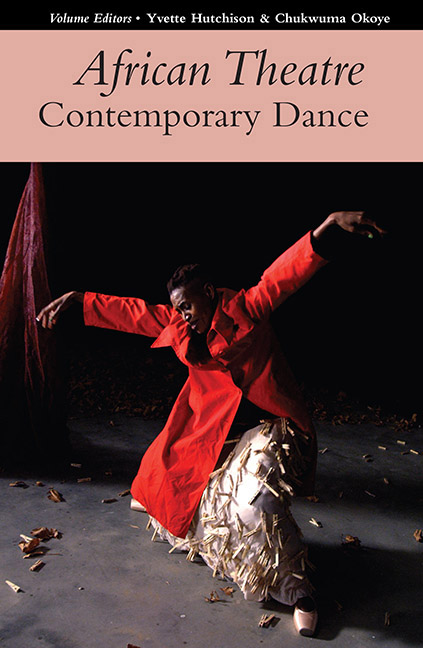Book contents
- Frontmatter
- Contents
- Notes on Contributors
- Introduction
- I Dance
- James Mweu & Kunja Dance Theatre Contemporary dance as African cultural production
- Looking Behind the Mirror Challenging representationalism in contemporary dance in postcolonial African contexts
- Decolonising the Stage Reflecting on Mamela Nyamza in a Canadian-hosted South African performance festival
- Unmuting South African Citizenship through Integrated/Disability Dance
- From Television to the Streets The rise & rise of dance-based advertising in Nigeria
- Dance Photo Essay ‘Untitled’: FOD Gang's environmental activism
- II Open Section
- Book Reviews
Decolonising the Stage Reflecting on Mamela Nyamza in a Canadian-hosted South African performance festival
from I - Dance
Published online by Cambridge University Press: 26 July 2019
- Frontmatter
- Contents
- Notes on Contributors
- Introduction
- I Dance
- James Mweu & Kunja Dance Theatre Contemporary dance as African cultural production
- Looking Behind the Mirror Challenging representationalism in contemporary dance in postcolonial African contexts
- Decolonising the Stage Reflecting on Mamela Nyamza in a Canadian-hosted South African performance festival
- Unmuting South African Citizenship through Integrated/Disability Dance
- From Television to the Streets The rise & rise of dance-based advertising in Nigeria
- Dance Photo Essay ‘Untitled’: FOD Gang's environmental activism
- II Open Section
- Book Reviews
Summary
This essay explores the ways in which contemporary dance can act as a catalyst for decolonial conversations when toured transnationally, detailing the ways in which South African choreographer Mamela Nyamza interrogates colonial constructs of power, identity, and gender through her work; and how her work has the potential to open up meaningful transnational conversations in a Canadian context through her participation in the Canadian Stage's Spotlight South Africa festival (Toronto). I begin by contextualising Nyamza's work within the festival, including the context of current Canadian socio-political concerns. I then go on to consider how Nyamza's work has the potential to agitate and subvert long-established Euro-Western performance traditions as she masterfully integrates traditional African and contemporary performance styles, and thereby disturbs comfortable understandings of Western dance practices.
In April 2015, six South African works were hosted at Canadian Stage's Spotlight South Africa festival in Toronto. This festival was the third iteration of the biennial Canadian Stage spotlight format which aims to expose Toronto audiences to renowned international artists while creating dialogues between contemporary Canadian performance and international artistic expertise. Canadian Stage Executive and Artistic Director, Matthew Jocelyn said of the lineup, ‘Toronto audiences have a healthy appetite for strong contemporary art by thoughtful, radical creators from around the world … We're helping to feed it with the largest celebration of South African artists that Canada has ever held’ (quoted in Kaplan 2015). The Festival was planned to mark the twenty-fifth anniversary of Nelson Mandela's liberation, and pay tribute to the man, following his death at the end of 2013. It also marked the 20th anniversary of democracy in South Africa in 2014. The three-week programme included Athol Fugard's Nongogo (Market Theatre, 1959); two separate works by Mamela Nyamza, The Meal (2012) and Hatched (2009); Jane Taylor and William Kentridge's Ubu and the Truth Commission (Handspring Puppet Company, 1997); Luyanda Sidya's double-bill Dominion (2013) and Umnikelo (2011) with Vuyani Dance Theatre; and Steven Cohen's Chandelier (2001). Each week of the festival opened two productions, beginning with Nongogo and The Meal, the second week paired Ubu with Hatched, and Dominion and Chandelier closed the festival in the final week.
- Type
- Chapter
- Information
- African Theatre: Contemporary Dance , pp. 45 - 66Publisher: Boydell & BrewerPrint publication year: 2018



